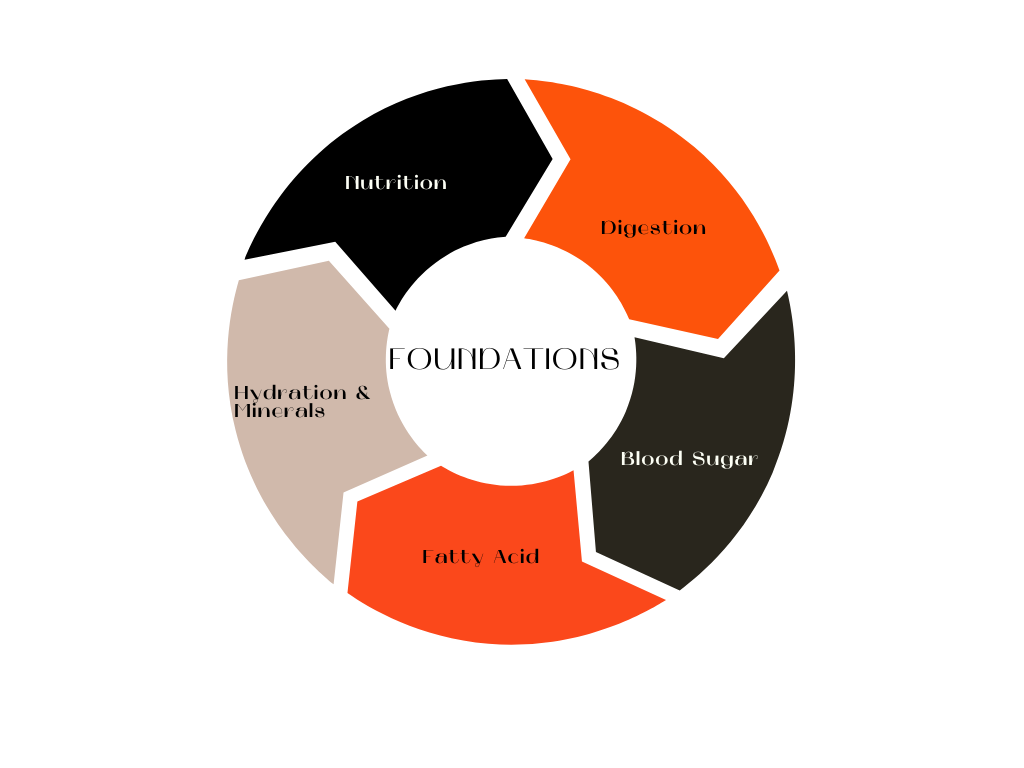By understanding the foundations of wellness we can maintain optimal health by creating an environment our body can thrive in. These include nutrition, digestion, blood sugar regulation, fatty acid balance, hydration and minerals. All these components are interconnected and need to be taken into consideration when creating a lifestyle that promotes wellness. By understanding the importance of each component and how they interact with one another we can create an individualized plan for achieving optimal health.
Nutrition
Eating a balanced diet is essential for maintaining overall health and well-being. Nutrition provides the fuel and essential building blocks the body needs to maintain balance. To ensure optimal nutrition, it is important to tailor your diet to meet your individual bio-needs, rather than following fad diets.
Nutrient dense whole foods, properly prepared and eaten seasonally and organically are key components of a healthy lifestyle. Whenever possible choose grass-finished meats, pasture-raised poultry and eggs, and wild caught seafood.
An anti-diet approach that focuses on intuitive eating is also recommended as it encourages mindful eating habits that can help you make better food choices. By listening to your body’s needs and developing an understanding of what works best for you, you can create a bio-individual diet that will provide the nourishment and energy needed for optimal health.
Digestion
Digestion is a complex system that starts in the brain and cascades through a series of events and organs to chemically break down foods and absorb the nutrients that fuel and build every cell in the body for optimal function. Digestion starts with chewing food properly, adequate stomach acid, producing digestive enzymes and bile, and being in a parasympathetic (or rest and digest) state. It is not just what we eat, but what we absorb that matters.
When any part of this system is not functioning properly it can have a ripple effect throughout the body, resulting in a whole host of health issues. One of the most common problems caused by digestive dysfunction is leaky gut syndrome. Leaky gut occurs when undigested food particles pass through the gut wall and overwhelm the immune system, leading to a range of autoimmune diseases. In many cases, this problem can be traced back to a lack of stomach acid production which prevents proper digestion from taking place in the first place. This highlights just how important it is for us to take care of our digestive systems if we want to stay healthy and avoid serious health complications down the line.
Blood Sugar Regulation
Blood sugar balance is critical for the body to function at its best, producing and maintaining energy, balancing hormones, and maintaining optimal function. Blood sugar regulation begins with balancing macronutrients (carbs, fat and protein). The goal is to have a steady release of energy throughout the day, which leads to stable energy levels and reduces feelings of hunger. This means eating regular meals that are balanced with carbs, fat and protein so your body has enough fuel to run efficiently all day long.
The quality of your food also affects blood sugar regulation. Processed foods, refined carbohydrates and sugar cause sharp spikes in blood sugar levels, which can lead to energy swings, mood changes and cravings for more sugar or carbs.
Reducing stress levels, getting adequate sleep, and engaging in regular movement also help balance blood sugar.
Blood sugar imbalance can lead to a variety of symptoms including fatigue, weight gain, unstable moods and cravings for sugar or refined carbohydrates.
Fatty Acid Balance
Fats not the enemy! In fact, the body needs a balance of different types of fat to be healthy. Fats play numerous important roles in the body including: energy production and energy absorption, building blocks for cell membranes and hormones, absorbing fat-soluble vitamins (A, D, E, K), proper us of proteins, increase satiety, regulate inflammatory response, etc.
Not all fats are created equal. Stay away from hydrogenated oils that become rancid such as canola, soy and cottonseed oils. I prefer stable fat sources such as grass-fed or raw butter, tallow, or coconut oil when cooking with high heat. High quality, cold pressed olive or avocado oil are used when not cooking with heat.
Hydration and Minerals
Water is the most important nutrient as it is required for numerous body processes. Consuming adequate amounts of water or mineral rich beverages is critical. Similar to digestion, to benefit from water consumption we need to absorb it which requires specific minerals called electrolytes. Thus, water and minerals go hand-in-hand.
Minerals are the spark plugs of life as they are required for every system to function. Main roles of Minerals in the body include: transfer of nutrients, proper nerve conduction, tissue growth, etc. We cannot make minerals on our own so we must get them from food and beverages we consume.
For more information on Minerals, check out my Hair Tissue Mineral Analysis (HTMA) post!
Conclusion
Check out my subsequent blog posts for more in-depth details on these foundational health pillars.
Book a free consult if you want to work with me to develop a bio-individual protocol incorporating these foundations.

